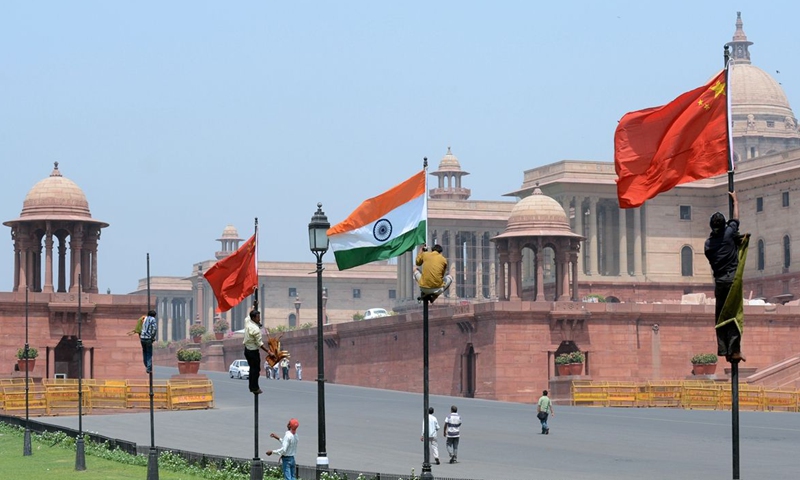India can change course for the better with China
By Lou Chunhao Source: Global Times Published: 2020/7/8 0:06:01

China India Photo:AFP
India's relations with many of its neighboring countries have recently been tense. India has exchanged fire with Pakistan on the Line of Control. The India-Nepal border dispute escalated too, not to mention the confrontation with China in the Galwan Valley. Such situations are an inevitable result of India's increasingly aggressive, and even adventurous, recent foreign strategies.Such aggressiveness is not only because of India's strategic goal of dominating South Asia since its independence. It is also due to the country's uprising nationalist sentiment and opportunism. It wants to seek profits from the intensifying China-US competition.
However, if India lacks enough wisdom to manage risks, its blind strategic aggressiveness will only cost it a heavy price. Before implementing its aggressive policies, the Indian government should answer these questions: Is an adventurous strategy in line with India's national development goals? Does India have enough resources to implement such strategies? Is it prepared to bear the risks? Judged from India's history after its independence, the answer to all of the three questions is "no."
An adventurous strategy will be detrimental to India's national development goals. To boost development, India needs a stable and peaceful surrounding environment. Unfortunately, India's national development has been impacted by surrounding turbulences since its independence. There are complicated historical reasons. However, India's aggressiveness also played an extremely negative role in these affairs.
For example, the Jawaharlal Nehru administration implemented the reckless Forward Policy at the China-India border area - its adventurism was hit hard by the Chinese side. The Indira Doctrine - regarded as India's Monroe Doctrine - led to India's interference in its neighboring countries' internal affairs. This exhausted resources that could be used for domestic development and clearly impeded India's economic development.
Since Indian Prime Minister Narendra Modi took office in 2014, his administration has pursued a "neighborhood-first" policy. But this has failed to tackle India's strained tensions with Pakistan. Instead, relations between New Delhi and Islamabad have been damaged with security deteriorating in India-controlled Kashmir. It has simply impaired India's development.
India's strategic aggressiveness will lead to strategic overdrafts. At present, its foreign strategies do not line up with its comprehensive national strength. Historically, India witnessed its global reputation decline after its failure in the 1962 China-India border war. Modi's relentless pursuit of world leadership without sufficient hard power demonstrates that his policies are unsustainable and even vain.
After the Modi government came to power, it has emphasized the transformation of India from a "balanced force" in international affairs to a "leadership force." Major powers such as the US, the EU, Russia, and Japan are all trying and competing to woo India, which has led India to misjudge its own strength. India has faced an economic slowdown since the second half of 2017. The continuous spread of the COVID-19 pandemic has also impacted India's economic and social development.
Under this circumstance, some Indians still believe that by showing strength abroad, they can transfer domestic conflicts and condense nationalist sentiment. But history has proven that empty nationalism divorced from economic development eventually exhausts itself — and peters out by stretching resources too thin.
A rash strategy will cost India a heavy price. The capabilities to fend off risks are also an important factor that tests the adequacy of a country's foreign policies. Whenever the tension on the China-India border is aggravated, there are some Indians claiming that India is no longer what it was in 1962 In terms of national strength. India is definitely not what it used to be. But is China still the country of 1962? Between 1962 and 2020, the gap in terms of national strength between China and India has kept widening.
Certainly, India today believes it can profit by virtue of the ongoing rivalry between China and the US. This seems to have encouraged New Delhi to mount pressure on Beijing. New Delhi shouldn't misjudge the situation again as it did in 1962.
Stable bilateral ties are in consistent with the common interests of both countries. We hope to see India properly handle its domestic nationalist sentiments, and overcome its strategic adventure. If New Delhi continues on the path of strategic aggressiveness, it will ultimately undermine its long-term development — and also harm a stable and friendly relationship with its ancient neighbor China.
The author is deputy director of the Institute of South Asian Studies at the China Institutes of Contemporary International Relations. opinion@globaltimes.com.cn
Posted in: VIEWPOINT